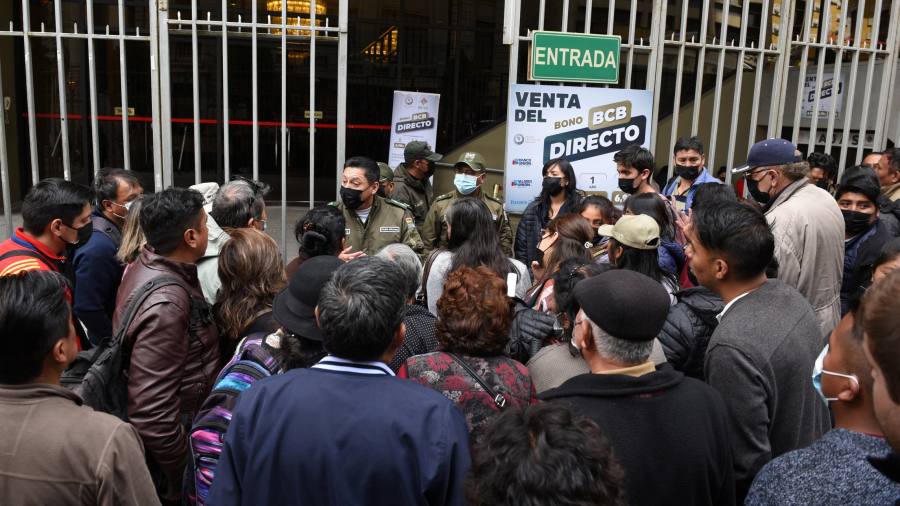“WeAreAStableCountry”, Bolivia’s central bank has said on Twitter repeatedly this month. The long queues of people outside its offices clamouring to buy dollars suggest otherwise.
The impoverished South American nation’s foreign exchange reserves have been shrinking for years, threatening the boliviano’s peg to the US dollar. As of February 8, just $372mn of net reserves and $3.5bn of gross reserves remained — not enough to cover even three months of imports. The central bank has not published fresh figures since and investors are asking how long Bolivia can stave off a devaluation.
In a sign of the deepening crisis, Fitch on Tuesday downgraded Bolivia’s debt deeper into junk territory, assigning it a B minus rating with a negative outlook. The rating agency cited “heightened uncertainty around the authorities’ ability to manage this situation, as well as around its severity given an ongoing delay in publication of international reserves data”.
Bolivia’s 2028 sovereign bond was trading at 64 cents in the dollar on Wednesday, a level that suggests investors believe there is a meaningful chance of default. The price is down from 80 cents at the start of the year.
Behind the immediate crisis is a more serious long-term problem: Bolivia’s economic model of the past two decades is bust. The landlocked nation of 12mn people has prospered for years by exporting natural gas to its neighbours but reserves are declining fast and by 2030 Bolivia is likely to become a net importer.
The central bank made the unconventional move this month of offering to sell dollars directly to the public after Bolivians complained of difficulty in finding the US currency at banks and exchange houses. Last Sunday, the central bank said it had sold $24.1mn of its reserves to the public between March 6 and 12.
Central bank president Edwin Rojas said that the buyers of dollars had been “victims of a speculative process” and a bank press release claimed it had “satisfied the public’s demand” last week.
But queues of people trying to buy dollars continued to form outside the central bank’s headquarters in La Paz this week. People also waited outside branches of Banco Union, a state-controlled bank permitted by the central bank to sell dollars, in the cities of Santa Cruz and Cochabamba.
The crisis of confidence spread on Tuesday to Banco Fassil, a privately owned bank with $4.2bn in assets. Customers rushed to withdraw savings amid rumours, denied by the bank, that Bolivia’s financial regulator was about to intervene. People waited outside branches to withdraw cash, with some telling local media they were not allowed to take out more than 10,000 bolivianos ($1,451).
Banco Fassil said in a statement that the crisis was caused by “specific interests orientated towards generating destabilisation in the Bolivian financial system”.
The finance ministry did not respond to requests for comment and the central bank referred inquiries to its published statements.
Economists said that Bolivia’s economic problems were deep-rooted and called for drastic measures. “Foreign exchange reserves are so depleted that it will be very difficult for Bolivia to avoid a correction in the exchange rate and exchange controls,” said Ramiro Blazquez, head of research at BancTrust in neighbouring Argentina. “They could raise interest rates to try to fend off a devaluation but at some point, they will have to do it.”
Years of statist policies by Bolivia’s socialist government have scared off investors and deterred fresh oil and gas exploration. Ruinously expensive fuel subsidies have spawned a flourishing contraband trade, with dirt-cheap Bolivian diesel being smuggled over the border to be sold in neighbouring Peru and Chile. Fuel imports shot up from 11 per cent of Bolivia’s total imports in 2015 to 34 per cent last year, estimated rating agency S&P Global Ratings.
Bolivia’s gold reserves could provide an alternative source of foreign exchange reserves but they are mostly mined by unregistered operators who smuggle as much as $2bn a year of the precious metal out of the country, according to some estimates. The government is trying to pass a law that would allow the central bank to buy gold directly from informal miners and use its current reserves more freely but this is stuck in Congress.
The economic crisis comes amid an increasingly bitter political fight between President Luis Arce and his one-time ally, former president Evo Morales. Arce served as finance minister in Morales’s last government but the two men have since parted company in a power struggle that has split the ruling Movement to Socialism (MAS).
“The government has very little room for manoeuvre,” said Luis Prato, senior economist at Torino Capital in New York. “They have some short-term possibilities to access liquidity, such as selling IMF SDRs [reserve assets] or speeding up loans from multilateral lenders . . . but the biggest challenge is the fiscal deficit, which will be 6.5 per cent this year.”
Bolivia’s general government debt was about 66 per cent of gross domestic product in 2022, but most is owed to multilateral lenders. Foreign debt owed to private bondholders is low, at just $2bn, with debt service of $300mn due in 2023, according to Fitch.
“While these are low amounts, the sovereign’s capacity and willingness to pay them could be called into question should international reserves continue to dwindle,” the rating agency said.
Read the full article here





